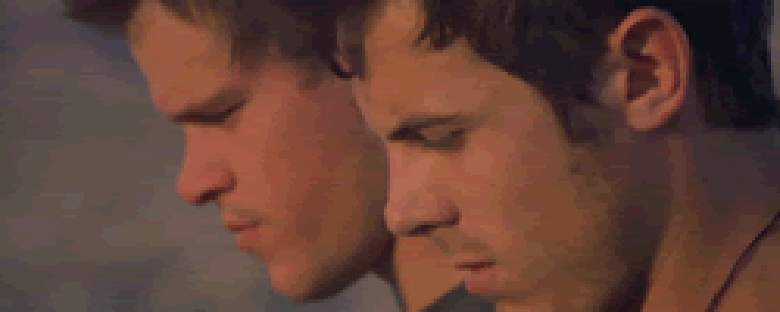Reviews
Gus Van Sant
USA, 2003
Credits
Review by Rumsey Taylor
Posted on 11 July 2004
Source Buena Vista Home Video DVD
For minutes we follow two characters, both named Gerry, as they traverse across an unfamiliar desert. Their faces are framed tightly, bobbing vertically in the composition in an endless visual rhythm scored only in the redundant crunching of footsteps. In the time that these characters are only walking, an image is established without any context, history, or justification — an independent and evocative hypnosis, like most every other scene in Gerry. This stubbornly inconclusive image conveys — unequivocally — thoughtless desperation, and follows characters without direction, distraught with the thought of imminent death.
Gerry opens cold without title credits or a company logo and is composed almost entirely of considerably staged long shots, the first framed statically behind a car traveling down a desolate highway. The first line of dialogue is delivered some ten minutes later. Every single shot in Gerry relays this opportunity to ponder the circumstance, for the viewer to intuit and produce his own reactions. Inevitably, such opportunity fosters discrimination. The film debuted at Sundance in 2002, was released theatrically in 2003, and has produced the most polar responses. Some have named it among the best films of 2003 (it is paramount among my favorites of the year); many others stated their criticism by walking out.
Stylistically and conventionally, Gerry possesses little of the vocabulary of commercial cinema. Notice how on two occasions the Gerrys build fires, and each time we are spared an obligatory summary of their strife to do so. The film’s visual highlights contain little action or discourse, as in the film’s centerpiece involving one of the Gerrys marooned atop a boulder, filmed entirely from a stationary perspective. There is variety in staging and blocking, between close-ups and distanced master shots, but the photography maintains the environment’s lack of familiarity. The Gerrys see a vast, completely anonymous horizon in any direction, and our view remains enduringly focused on their expressions of desperation.
Gerry proposes simplicity; even the most capsulated descriptions of it are dubious. The film is concerned solely with character, and most every other citable filmmaking aspect is second-service, if not entirely excluded. For much of the film the view tails these characters at their side. Their direction is never seen, the background out of focus, and we remain transfixed upon countenances that impart more than dialogue.
We don’t do comments anymore, but you may contact us here or find us on Twitter or Facebook.



